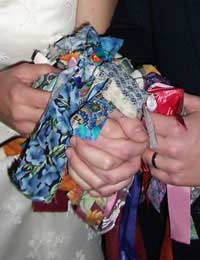Handfasting and Marriage

Over the years there has been a great deal of confusion regarding handfasting and marriage. It’s become a ceremony adopted as marriage by modern pagans, and there are those who believe that when it was common, handfasting was not a marriage, but simply a trial marriage.
This is wrong. Handfasting was never a trial marriage. It was a betrothal, a promise of marriage. It was widely practiced in Scotland, and also in some parts of the North of England, even after the Protestant reformation of the Church – in Scotland known as the Kirk. But its roots are very much in medieval times.
Medieval Marriage
In medieval times, marriage was a vow made between two people. There didn’t even have to be witnesses. The promise was made, all importantly, before God. It could either be in the present tense, or a vow to marry in the future. With that future vow, once the couple had enjoyed sexual intercourse, they were married. There was no need for banns or a priest’s blessing on the union.At the time most church marriages were done at the church door, not inside the church. These were performed by the priest and classed as “regular” marriages that would go in the parish register. The other kinds of marriages, although quite legal, were known as “irregular” or “clandestine,” and so not recorded, making them impossible for a genealogist to discover.
There was no divorce at this time, although a marriage could be annulled if it was proved that the marriage was never legal for some reason, such as consanguinity. Things remained that way until divorce became possible under the Reformation.
Betrothal
Betrothal in older times was a far more serious business than modern engagement. It involved negotiating and exchanging contracts of marriage, and once, betrothed, there was no going back.In Scotland and in the North of England, handfasting was the equivalent of betrothal. It involved, quite literally, the joining of hands of the couple that were becoming betrothed. A handfasting here meant that the couple would marry in the future. However, if they had sex following the handfasting they were then married, whether there had been a ceremony or not.
Post-Reformation
The Catholic Church reformed its marriage laws at the Council of Trent, and clandestine marriage was no longer acceptable. All marriages had to be performed by a priest to be legal and accepted.That wasn’t the case in Scotland, though, which had already undergone its Protestant Reformation. As long as there was mutual consent, either in the present or for the future, and it was followed by the couple having sexual intercourse, they were married. These marriages were not only recognised by the Kirk but also under Scots civil law.
But the Kirk did demand that these couples also undergo a formal marriage at the kirk and also receive some punishment for not marrying the official way. Things did change over time, and future contracts were no longer viewed as marriage by the Kirk by the 18th century.
The irony is that civil law in Scotland did still recognise these clandestine marriages, and would continue to do so into the 20th century, when laws finally changed.
So handfasting could become marriage if followed by sexual intercourse, but in technical terms at least, it wasn’t the equivalent of marriage as seen in modern terms, but more like engagement.
- Were Fleet Marriages Taken as Legal?
- The Problems With Common Law Marriage
- New Zealand Marriage Records
- Genealogy Searches and Pre-1538 Marriage Records
- Genealogy Source For Non-Anglican Marriages
- Genealogy Sources For Non-Anglican Ancestors
- How to Use Church Marriage Records to Trace Your Ancestors
- Marriage Certificate Problems
- Marriage Records: Scotland, Ireland, Channel Isles
- Using Marriage Certificates for Genealogy Research


Re: Maiden Names in Genealogy
Hello! Nice community. Need key info. Thanks:)
Re: Maiden Names in Genealogy
Hi. Nice forum. Searching for key help. Thanks:)
Re: Maiden Names in Genealogy
Kak esehiko sminor k112 exploregenealogy.co.uk
Re: Using Criminal Records For Family History Research
Trying to find dads past history with arrests just out of interest as hes recently passed away and…
Re: Using Criminal Records For Family History Research
Hi all i wanted to find out about my dad's past and nobody seems to know much about it or what he did.…
Re: Maiden Names in Genealogy
Looking for my fathers mother maiden name
Re: Genealogy and a Criminal Past
I am trying to find out about my father crime in 1992 or 1993 my father as pass away 1998 and I would like to find out why he got…
Re: Using Criminal Records For Family History Research
I am trying to find my biological father's police criminal record as I was abused as a child but have…
Re: Cremation Records and Tracing Your Family History
I am trying to find out where has my friends aunt Adelinda Diaz McMullen was cremated and who was her…
Re: Cremation Records and Tracing Your Family History
CAN SOMEONE PLEASE HELP ME WITH TRYING TO FIND OUT WHERE MY FATHER WAS CREMATED/BURIED IN KENT UK. I…